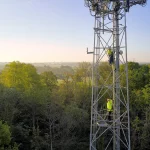2021 vs 2015 Netflix UK Video Streaming Broadband ISP Speed Index

Once again, we’ve taken our annual look back to see how video streaming speeds via different broadband ISPs have changed for UK users of Netflix’s popular internet movie and TV service. Once again, the top spot continues to be held by Virgin Media (VMO2), but this doesn’t mean what you might think.
Overall, the performance – measured during November of each year – across all the largest UK home broadband providers, has actually decreased a little since 2019 (2020 was skipped because Netflix stopped doing their index due to COVID-19). Indeed, the average speed (Megabits per second) for most providers is now struggling to push above c.3.8Mbps (Megabits per second) – down from the 2019 peak of c.4.5Mbps.
At this point we should highlight that the results for some ISPs have been oddly split by their “DSL” and “Fibre” networks, although it’s unclear whether they mean FTTC (VDSL2), FTTP or both for “Fibre“. Equally, we’re unsure why Netflix has done this for TalkTalk and Sky, but not the other providers, which also have a similarly diverse range of technologies.
Advertisement
One other issue is that Netflix seems to have adopted rounded averages in 2021, which means you can no longer see the subtle differences in performance between ISPs. In the end, Virgin Media topped the table on a speed of 3.8Mbps (down from 4.48Mbps in 2019) and most of the rest produced an identical score of 3.6Mbps.
| ISP | 2021 | 2019 | 2015 |
| Virgin Media | 3.8Mbps | 4.48Mbps | 3.98Mbps |
| BT | 3.6Mbps | 4.45Mbps | 3.78Mbps |
| TalkTalk Fibre |
3.6Mbps | 4.36Mbps | no data |
| EE | 3.6Mbps | 4.24Mbps | 3.27Mbps |
| Plusnet | 3.6Mbps | 4.13Mbps | 3.48Mbps |
| Sky Broadband (Fibre) |
3.6Mbps | 4.13Mbps | 3.33Mbps |
| Vodafone | 3.6Mbps | 4.12Mbps | no data |
| TalkTalk DSL | 2.8Mbps | 3.38Mbps | no data |
However, the above results are essentially just a measure of Netflix’s own video streaming performance. Put another way, the index should NEVER be taken as a table that reflects the actual capability of your own home broadband connection, although some other reports have incorrectly explained it like that.
The reason the speeds are so low is because they’re being influenced by a number of key factors, not least the proportion of subscribers who are viewing content in either a low-quality video bitrate like SD (Standard Definition), higher quality HD (High Definition 720p+) or even a 4K (UltraHD) stream.
Crucially, Netflix offers three packages (Basic – £5.99, Standard – £9.99 and Premium – £13.99) and the most popular ones are usually the cheapest two. However, the ‘Basic’ plan only supports SD quality streaming on 1 device, while ‘Standard’ supports HD streaming on 2 devices and ‘Premium’ supports up to 4K streaming on 4 devices. This is important because the transfer speed requirements are influenced by content quality.
Advertisement
Netflix’s Recommended Connection Speeds
* 0.5Mbps – Required broadband connection speed
* 1.5Mbps – Recommended broadband connection speed
* 3.0Mbps – Recommended for SD quality
* 5.0Mbps – Recommended for HD quality
* 25Mbps – Recommended for Ultra HD quality
In other words, the results from each ISP above suggest that the majority of Netflix users are streaming videos in HD and SD, which is reflected in why most of the scores hover just below 4Mbps. But the results can also be impacted by other factors, including video codecs / compression (i.e. bitrates vary as the video stream changes), slow home WiFi, home network congestion and any ISP-side Traffic Management measures etc.
Similarly, ISPs that offer significantly faster speeds are more likely to represent Netflix users with a greater proportion of HD or even 4K accounts, thus it’s no surprise to find that Virgin Media come top of the big boys because their entry-level package is a respectable 50 – 100Mbps.
Over time the rising uptake of faster broadband connections and 4K screens should push the results upwards, but this is often countered by future price hikes that can cause users to downgrade to a lower tier. The results from other countries also tend to be similar to the UK (e.g. South Korea is one of the fastest countries in the world for broadband, but its top ISP is LG U+ at 3.8Mbps).
Ultimately the usefulness of Netflix’s data is questionable and the streaming giant might do better to display extra details, such as by splitting out the difference in performance between SD, HD and 4K streaming, as well as showing the impact at different times of the day (e.g. peak vs off-peak). Sadly, they’ve never provided that information or offered data for smaller ISPs.
Advertisement
This will be the last time we report on Netflix’s speed index as, with connections now getting much faster, it no longer provides any useful context for the wider market.
Mark is a professional technology writer, IT consultant and computer engineer from Dorset (England), he also founded ISPreview in 1999 and enjoys analysing the latest telecoms and broadband developments. Find me on X (Twitter), Mastodon, Facebook, BlueSky, Threads.net and Linkedin.
« Smarty Plans Early 2022 Launch for 5G Mobile Service






















































25mbps is not enough for 4K IPTV streams will lag like hell even with 100mbps. Unrealistic expectations. And also upload speed matters a lot if you want to avoid buffering lag. So 25mbps is not enough.
It depends on the compression algorithm and how aggressive it is. I’ve found h.265 to be pretty good, and I think that’s what Netflix uses too.
Rubbish – I run 4k streams on 70Mbps fine.
Netflix uses VP9 which is roughly equivalent to H.265 and more than capable of streaming 4K at 25Mbps.
Rubbish. I did absolutely fine yesterday on my 60 meg connection. Of which I was streaming Disney + and downloading games off epic.
Barely any issues running at 15mbps for 4K on Netflix and Amazon Prime cheers.
As far as I can tell, Netflix 4k streams are around 15mbps average. The 25mbps connection stipulation is just ensure adequate headroom in the connection to minimise interruptions.
You don’t know what is compression? Netflix and other streaming sites don’t serve you “straight” 4k with full bitrate, it is dynamic.
Even a remuxed Blu-ray is sub 100mbps. As others have said, Netflix is typically around 15mbps for 4K, hence why some 4K enthusiasts snub it. Literally any upload speed is fine also.
Nonsense. If you’re having trouble doing a 4K stream from Netflix or YouTube or whatever on a 100 meg connection, your problem isn’t the connection.
Upload speed does not matter. You are wrong.
25Mbps is the bitrate Netflix use. If you have a 100Mbps there’s no logical reason it would “lag like hell” since Netflix is only sending you data at 1/4 of your line rate.
I can run 4K HDR 10+ on my TV with as low as 20 meg…..
Ive a daughter with soecial needs, on youtube all the time, ive a duaghter online all the time, misses on FB and im watching dont look up on Netflix 4k on 79megs and its perfect.
4k streaming is pathetic. 4K UHD Blu Ray is the only thing that truly exemplifies better bitrate and sound quality!
We are being blinded by this rubbish! I pay for Prime and Netflix and 4k is pathetic a 1080p Blu ray Disc is better!!!
Couldn’t agree more. Some of my disks hit 20Mbps & 100 for video. I’ve only got 14Mbps connection & can stream Netflix in UHD DV. This includes all my US Apps via Windscribe.
Seems you are being blinded by them given you think they’re so poor but continue to pay for them.
I believe Netflix 4K is around 15 to 18mbps and are starting to use the AV1 codec and will be using it more.
I don’t know why Netflix streaming was ever used as an ISP benchmark when it’s clearly not made for this.
To benchmark it, simply go to a benchmarking site like speedtest.net, or download a big file and use a network monitoring app.
Seems from the trend that Netflix has reduced the bitrate of their streams from 2019 to 2021. I wonder what the justification was? Better compression? Or cheaping out on bandwidth?
I always find that streaming services like Amazon and Prime Video look terrible in dark scenes. They’ve blown all of the contrast and details out in dark scenes, the pixelated compression banding is terrible. It’s probably because they think people are unlikely to notice compression in dark areas of the scene, but for me it makes some content hard to watch.
I wish they’d have an option to stream at a higher bitrate rather than dumb down the settings to (“720p”, “1080p”, “4k”) when these resolutions are meaningless when you’re squeezing them into a 3 meg stream.
Where’s my 12Mbps 1080p stream option?
The stream bandwidth was dropped in 2020 alongside other providers to mitigate issues with some countries’ networks not being up to the sudden increase in load.
The UK was actually fine, yes our paying more does actually pay for higher quality, but was collateral damage for reasons I am not clear on.